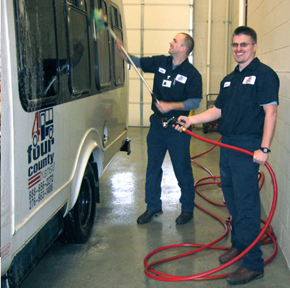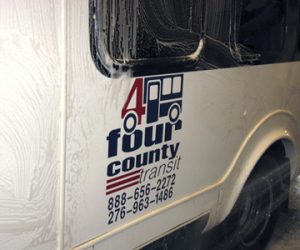By Joe Ratliff

Rain is grace, wrote the late author John Updike. In southwest Virginia, Four County Transit (FCT) has found his notion to be very true. Over the course of two stormy days this past winter FCT managed to captured 10,000 gallons of precious rainwater — enough to wash 400 buses.
According to the U.S. Drought Monitor, southwest Virginia has experienced moderate to abnormally dry conditions during the past decade, and had evolved into full-scale drought by 2006.
Four County Transit is a fully coordinated rural public transit system that serves 118,000 citizens in the coalfields of southwest Virginia. Operating in a mountainous region with forests covering 80 percent of a service area that spans 1,830 square miles, FCT encompasses Buchanan, Dickenson, Russell and Tazewell counties, which comprise the Cumberland Plateau Planning District.
When the drought struck, Governor Timothy Kaine declared our four counties primary or contiguous drought disaster areas.
As we looked at the all-too-clear sky, we realized every little drop of rain counts. To that end, FCT decided to install a rainwater collection system in its new administrative and vehicle maintenance facility. Today FCT is the only public transit in southwest Virginia that boasts such a system.
During the planning of our new facility, we tossed around several cost-saving ideas, including element harvesting. Drawing on the power of wind did not seem feasible at the time, but rainwater collection did. The Virginia Department of Rail and Public Transportation (VADRPT) distributed some of its Federal Transit Administration (FTA) monies, and our localities also helped fund the project with small matching grants.
We installed the system in late 2008. Our rainwater capture system includes a collection tank, filtration component and pump vault. The underground coated steel weatherproof storage tank is 6.5-ft high and 16-ft long, large enough to collect 10,000 gallons of water before overflow occurs.
This system harvests rainwater that runs off the roof of the transit building as well as water from the roof of the nearby FCT parent organization, Appalachian Agency for Senior Citizens (AASC). The system stores the captured water until needed. With a simple spin of a valve, we can switch from using municipal water to using rainwater, routing it to our transit wash bay. In a matter of minutes dusty buses leave the garage with their red, white and blue colors gleaming in the sun.
While most people recognize the value of public transportation in helping reduce carbon emissions, many do not realize that many public transit providers are looking for other ways to be kind to the environment. In addition to harvesting rainwater, Four County Transit also collects and recycles all waste oil and other vehicle fluids with the exception of antifreeze.
With encouragement from VADRPT, Four County Transit explored this concept of recycling waste oil, and found that businesses that haul used oil and other fluids run the risk of spills that contaminate the environment. Because of the cost usually associated with off-site disposal, recycling waste fluids seemed like a sound idea.
We were able to purchase a storage and furnace unit through the generosity of VADRPT and matching local funds. The unit is located in our garage and holds 250 gallons of waste fluids. Our mechanics pour used fluids into the container and it transforms the waste into furnace heat. One gallon of waste fluid burns four hours. Our mechanics stay warm during the winter months without relying on electric heat.
FCT formed in 1998 through a demonstration grant from the Virginia Depart-ment of Rail and Public Transportation (VADRPT).

Prior to 1998 AASC, an area agency on aging, provided transportation services for participants at its senior congregate nutrition sites and senior citizen clubs. The VADRPT demonstration project provided limited demand responsive public transit services.
FCT evolved from this transportation program into a dynamic organization with the goal to provide residents full mobility through access to public transportation. Today we operate 58 vehicles on 20 public fixed routes, including municipal and county routes, college routes, connectors and work express routes.
It takes a lot of water to keep the fleet clean and shiny, and a lot of oil and other fluids to keep the buses on the road. We are managing it by going green and saving some green at the same time.
Always conscious of the fragile nature of our environment, Four County Transit is making better choices in its daily operations.
Joe Ratliff has served as general manager of Four County Transit for nearly three years.
